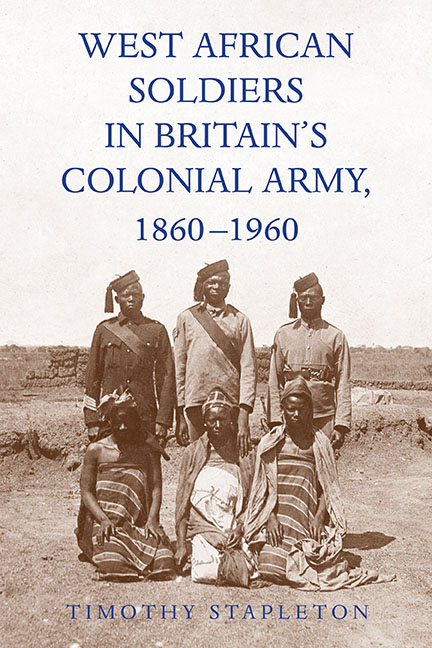Book contents
11 - Former Soldiers
Published online by Cambridge University Press: 07 October 2022
Summary
It is difficult to measure the impact of former colonial soldiers on British West Africa. During the colonial era, most soldiers served the usual minimum term of six years in the army and then returned to civilian society, thus disappearing from the military archival record. Over the whole colonial era, hundreds of thousands of men served in Britain's West African army, yet it is almost impossible to systematically trace them after discharge. Nevertheless, the popular notion that West African veterans of the Second World War returned home to continue their struggle for freedom and democracy through the nationalist movement obscures a more significant and empirically demonstrable impact of former colonial soldiers in the region. Throughout the period of British rule, a significant number of West African ex-soldiers continued their old military role of maintaining British control, becoming junior functionaries and enforcers for different parts of the colonial state and economy. These former soldiers turned colonial agents were usually those who had served longer-than-average terms in the army, fought in wars, received decorations, achieved promotion, and/or performed well. The most seasoned soldiers with around twenty years’ service were still in their forties upon discharge and usually had wives, young children, and extended family members to support. The army became an avenue into a second career. While these ex-soldiers possessed experience, skills, and proven reliability useful to the colonial state, British officials and officers clearly felt obliged to help them gain suitable and respectable paid positions. British officers in West Africa regularly circulated notices to civilian government departments about upcoming discharges of long-serving soldiers, recommending their employment in forestry, colonial police, native police, courts, prisons, and as uniformed messengers. At times, officers loaned travel money to recently discharged NCOs enabling them to take up government employment in other parts of the country or other territories. Similarly, colonial officials often wrote to the West African military looking for soon-to-retire African NCOs with supervisory and training experience to fill key positions.In colonial West Africa, a former soldier emerging from a successful military career and still physically fit represented a valuable and scarce human resource.
- Type
- Chapter
- Information
- West African Soldiers in Britain's Colonial Army, 1860-1960 , pp. 321 - 327Publisher: Boydell & BrewerPrint publication year: 2021

